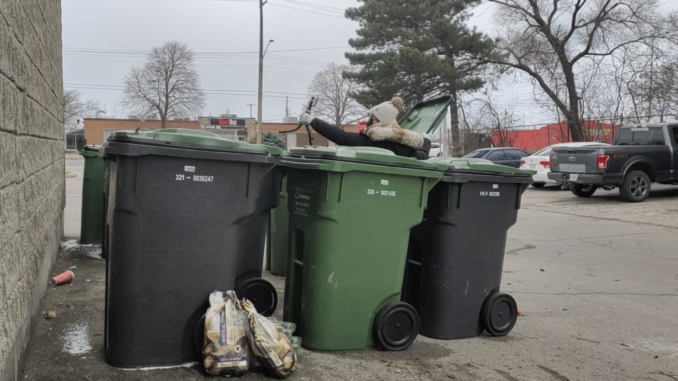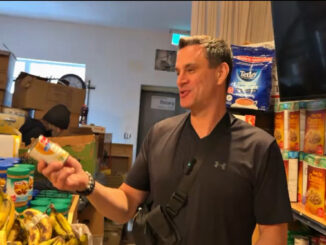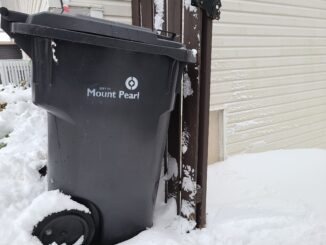
By Jay Ann Ramirez
North York — A resident in Hamilton, Ontario, is fighting food waste by rescuing food from dumpsters.
Mylene Martinez said growing up in a low-income family in the Philippines taught her the value of food. She has been living in Canada for eight years now.
“Don’t waste food. Food is very important. I know it’s hard to earn money nowadays, especially during a pandemic,” she said.
After resigning from her previous work for personal reasons, she found a new way to make use of her time — dumpster diving.
She started rescuing food from Hamilton dumpsters early this year, and she has been sharing her experience on social media to show people around the world that vast amounts of food go to waste.
The National Zero Waste Council said 63% of the food being thrown by Canadians this year could have been eaten. And most of the discarded food items were vegetables (30%), fruits (15%), leftovers (13%), bread and bakery (9%), and dairy and eggs (7%).
Martinez said she rescues food from trash bins three to four times a week, saving her around CAD$1,000 worth of groceries every month.
“We all know that all the food that they put in the dumpster will go directly to the landfill, right? So why not? Why not save food from the dumpsters?” she said.
Most of the food items she gets from the bins are bags of potatoes, celery, spinach, tomatoes, bell peppers, carrots, strawberries, bananas, and oranges.
“The only time I went to the grocery store was when I bought some okra, and that’s it,” she said.
She said she does not expect to get anything every time she goes to dumpsters. “But sometimes they surprise me,” she said.
She said dumpsters don’t only offer food but also other great finds like a functioning vacuum worth CAD$500 to CAD$700.

She said she only gets what she needs and what she can eat. She also shares the food with her friends or those who need them.
To ensure the food items are safe to eat, she removes the unwanted parts, washes them in warm water, and soaks them in vinegar and baking soda.
Why Food from Groceries Gets Tossed in Bins
Jim Chan, who served as Toronto’s Public Health Inspector for 36 years, said dumpster diving had been around for a long time.
He said people rescue food from dumpsters because of a lot of reasons.
“You have the homeless population who look for food anywhere they can find, including dumpsters and garbage bins,” he said.
There are also people whom he calls freegans. Freegans, he said, are those in the younger population or the general population that dumpster dive to get food to supplement their food budget.
“Some group that knows that there’s a lot of good food being tossed. They believe that by reducing food waste, you can reuse that food for personal consumption or they may share with friends, family, or even maybe a small group just having dinner on a regular basis using food that they dumpster dive collected,” he said.

From a commercial setting, Chan said the reason why food is being tossed by food shops is that they don’t sell it by the end of the day. All food establishments that sell, store, and distribute food are inspected locally by public health inspectors, he said.
“When they (products) reach and past the expiry dates, the store is not allowed to sell them because they can be a food safety issue,” he said.
Ontario has put in place a policy that requires businesses to prevent and reduce their food waste.
“Retail shopping establishments, retail shopping complexes, restaurants, hotels and motels and food processors that are large manufacturing establishments that generate more than 300 kilograms of food waste per week should identify where food waste occurs in their operations, conduct regular food waste audits to quantify the amount and type of food waste and take measures to prevent and reduce the amount of food waste that is occurring,” a statement from the policy read.
According to Ontario.ca, food products that are set to be disposed of are often donated by food service providers, retailers, wholesalers, and producers to social service agencies, community organizations, and other groups.
The beneficiaries can use the food items for initiatives that help those who urgently need them, according to the province’s official government website.
Food retailers in the country have said that they are committed to measuring, monitoring, and acting on reducing food loss and waste to 50% by 2025.
Chan said food items passed the best before dates are still safe to eat if correctly stored, but they don’t guarantee the nutritional value.
“Finding good food being tossed into the bin, maybe six or seven boxes of cold cut meat just because they passed the best before the date, that’s what the freegans or the dumpster divers look for. So, they would go through the package and say these are probably still good to eat,” he said.
Chan said dumpster divers must be aware of the risks before picking up food.
“I always advise anyone doing dumpster diving to know the area because you don’t just go up to any dumpster or behind a grocery store and start taking in stuff. So, if the food is contaminated from flooding, sewage backup, or even spilled chemicals, people will just toss it into a bin. So, if you just pick that up and take it home, sometimes they don’t smell bad. You don’t know whether it’s been spoiled or contaminated. So, eating food like that can be risky,” he said.
When asked if baking soda and vinegar can help disinfect food, Chan said, “There is nothing wrong with using vinegar as a cleaning agent, but that is not a disinfecting agent. Same as baking soda. It’s just a good cleaning agent. It may remove some contamination, but it’s not disinfecting the food itself.”
He said sometimes the only way to eliminate pathogenic bacteria such as E. coli or salmonella is by proper cooking and peeling the skin of fruits.
Reducing Food Waste Starts at Home
Chan said a lot of people think that food waste is only generated by commercial or business establishments. “Actually, it’s not true. It’s also generated from people’s homes,” he said.
He said food that ends up in landfills contributes to greenhouse gases.
The National Zero Waste Council said, “More than a third of food produced and distributed in Canada never gets eaten.”
According to the council, every year, $49-billion worth of food ends up in landfills or being composted.
A 2019 report on food waste by Value Chain Management International shows that the manufacturing industry is the top contributor to food loss or waste. Consumers come second and are followed by the processing industry. Distribution only makes up 5% of the food loss and waste.
He said proper food storage at home reduces food waste in the long run, and it does not end just by storing food in the refrigerator.
“You can buy all the products like milk, meat, cheese, any food from a supermarket brought at home, and it's nice and cold and safe. So, you put it into your refrigerator at home, which people just say that, oh yeah, it's a refrigerator (and) it’s cold, but not necessarily. If you look at it, the safe temperature at the refrigeration at home means that it is 4 degrees Celsius or below or 40 degrees Fahrenheit or below,” he said.
The government of Canada has provided a guide in chilling food to avoid the “temperature danger zone,” where bacteria can proliferate.
One of the guidelines for keeping food cold is to set the refrigerator to 4 °C (40 °F) or below and the freezer to -18 °C (0 °F) or below.
Chan, who has been giving food safety talks in universities after retiring, said it is important to think of the home kitchen as a food establishment.
“I always preach clean, separate, cook, and chew. If everyone practices the four steps, they will greatly improve food safety and reduce food waste,” he said.



Be the first to comment